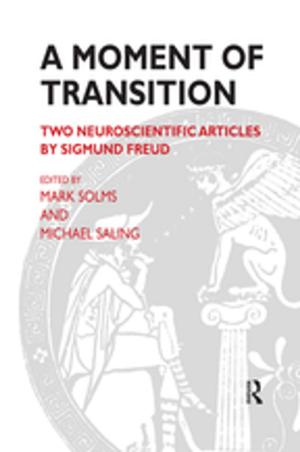| Author: | Randall Lehmann Sorenson | ISBN: | 9781134906574 |
| Publisher: | Taylor and Francis | Publication: | June 17, 2013 |
| Imprint: | Routledge | Language: | English |
| Author: | Randall Lehmann Sorenson |
| ISBN: | 9781134906574 |
| Publisher: | Taylor and Francis |
| Publication: | June 17, 2013 |
| Imprint: | Routledge |
| Language: | English |
In Minding Spirituality, Randall Sorenson, a clinical psychoanalyst, "invites us to take an interest in our patients' spirituality that is respectful but not diffident, curious but not reductionistic, welcoming but not indoctrinating." Out of this invitation emerges a fascinating and broadening investigation of how contemporary psychoanalysis can "mind" spirituality in the threefold sense of being bothered by it, of attending to it, and of cultivating it.
Both the questions Sorenson asks, and the answers he begins to formulate, reflect progressive changes in the psychoanalytic understanding of spirituality. Sorenson begins by quantitatively analyzing 75 years of journal literature and documenting how psychoanalytic approaches to religious and spiritual experiences have evolved far beyond the "wholesale pathologizing of religion" prevalent during Freud's lifetime. Then, in successive chapters, he explores and illustrates the kind of clinical technique appropriate to the modern treatment of religious issues. And the issue of technique is consequential in more than one way -- Sorenson presents evidence that how analysts work clinically has a greater impact on their patients' spirituality than the patients' own parents have.
Sorenson brings an array of disciplinary perspectives to bear in examining the multiple relationships among psychoanalysis, religion, and spirituality. Empirical analysis, psychoanalytic history, sociology of religion, comparative theory, and sustained clinical interpretation all enter into his effort to open a dialogue that is clinically relevant. Turning traditional critiques of psychoanalytic training on their head, he argues that psychoanalytic education has much to learn from models of contemporary theological education. Beautifully crafted and engagingly written, Minding Spirituality not only invites interdisciplinary dialogue but, via Sorenson's wide-ranging and passionately open-minded scholarship, exemplifies it.
In Minding Spirituality, Randall Sorenson, a clinical psychoanalyst, "invites us to take an interest in our patients' spirituality that is respectful but not diffident, curious but not reductionistic, welcoming but not indoctrinating." Out of this invitation emerges a fascinating and broadening investigation of how contemporary psychoanalysis can "mind" spirituality in the threefold sense of being bothered by it, of attending to it, and of cultivating it.
Both the questions Sorenson asks, and the answers he begins to formulate, reflect progressive changes in the psychoanalytic understanding of spirituality. Sorenson begins by quantitatively analyzing 75 years of journal literature and documenting how psychoanalytic approaches to religious and spiritual experiences have evolved far beyond the "wholesale pathologizing of religion" prevalent during Freud's lifetime. Then, in successive chapters, he explores and illustrates the kind of clinical technique appropriate to the modern treatment of religious issues. And the issue of technique is consequential in more than one way -- Sorenson presents evidence that how analysts work clinically has a greater impact on their patients' spirituality than the patients' own parents have.
Sorenson brings an array of disciplinary perspectives to bear in examining the multiple relationships among psychoanalysis, religion, and spirituality. Empirical analysis, psychoanalytic history, sociology of religion, comparative theory, and sustained clinical interpretation all enter into his effort to open a dialogue that is clinically relevant. Turning traditional critiques of psychoanalytic training on their head, he argues that psychoanalytic education has much to learn from models of contemporary theological education. Beautifully crafted and engagingly written, Minding Spirituality not only invites interdisciplinary dialogue but, via Sorenson's wide-ranging and passionately open-minded scholarship, exemplifies it.















